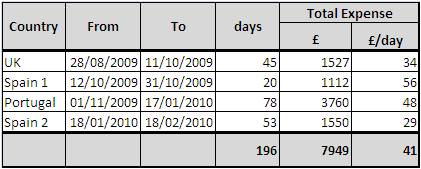How To Finance Your Trip?
Finance - Cycling The World On A Budget
To finance a long term trip necessiates setting a budget. The
earlier you can consider it the better. You have to be comfortable that
you can achieve your dream without leaving you destitute in your old
age.
Anyone who has had to manage a company, run a household or manage on
a student loan would agree that successful budgeting is not difficult
and yet so many people seem to have a problem with it, struggling to
make ends meet or ending up to their eyes in debt.
In our case we started to consider it well over two years ago. In
fact it wasn’t until we read Tim and Cindy Travis’ book “The Road that
Has No End” that we realised it was indeed possible to travel the World
with very little money. Before 2002 when Tim and Cindy were planning
their trip they set themselves an amount of just $21 per day for the
two of them – and they managed to stick to it. I know their daily
budget is a little more now.
We asked ourselves “Could we survive on that much?” “How much money
did we have available anyway?” “Would we have enough left at the end?”
“How long could we continue for and indeed, would we want to continue?”
We didn’t know the answers to any of these questions. So we made a
start by simply working out our pension provisions, savings, house
values, etc; in other words, our total net worth. I.e. the amount of
money we would have if we had to sell everything.
We also researched the cost of living in different locations and
realised that it is possible to live on a much lower income in areas
outside of the UK, Europe or the US.
Should we sell the house or rent it out? We decided that we didn’t
want the possible worry of renting out the house whilst we were half
way around the World and we didn’t want to pay a manager to do it for
us. Was selling a possibility?
We looked at how much pension provision we already had accumulated
and if we stopped paying into our pension funds how much would we get
at normal retirement age of 65. We have been fortunate in that we have
put money into our pension since our very first jobs and although there
were a few pension holes in the middle of our careers we have a
reasonable provision already, but will it be enough?
All of these and many other considerations figured in our
deliberations. While many of you may think that we are taking big risks
we still like a degree of security.
Neither of us are the type that jumps off a cliff on a piece of
elastic, without first doing our research. Our psychometric profile
show us as deliberating too long in making decisions. So we are
careful.
Finance - Building Our Sense Of Security
Our first main concern, assuming that we want to continue cycling
until formal retirement age i.e.65, was would we have enough pension
provision if we stopped paying into our pension today.
We started by getting predictions for all of pensions, including
state pension. We then considered the lifestyle that we would want to
lead at age 65. We would have done all of our main travelling by that
point, right? We’ve done the house building thing. We have had the huge
garden. So our lifestyle is likely to be at a much lower level.
Grandchildren will most likely figure highly at some point. Possibly
living nearer to our kids in a smaller house or living in a lower cost
of living location, that’s warmer and sunnier. Perhaps helping to fund
a business with one of my sons running it.
We worked out how much money we thought we would need when we retire
and came to an amount of about £2000 per month after tax. Our pension
providers predicted that we would be looking at an annual pension of
about £28,000 per year after tax. I.e. approximately £2300 per month.
So we were happy that our pension provision, although not startling
would be enough. This fact provides a large degree of security and for
all you young people out there, it demonstrates the benefit of paying
into a pension scheme from an early age.
Finance - Setting A Budget
The next thing was to decide what our costs would be as we were
travelling around, bearing in mind that some areas of the World would
be much more expensive than others. E.g. in Asia it is easy to have a
full meal for £3-4 each and get a bed for the night for £10 where as in
Europe even staying in a hostel will cost £20+ and a meal will be £10
per head minimum.
We felt that in the more expensive areas, the more that we could
camp (wild camp if possible) the more we could save. If we could, then
every now and again we could check into a hotel for a bit more luxury.
We originally established a finance budget of £50 per day for the two of us,
as an average global figure. Our sons, who had both done their gap
years, reassured us that we could easily do it for that amount. As the
recession has struck over the last 9 months, we have now reduced this
budget to £35 per day and will need to be much more frugal. “Perhaps we
shouldn’t go yet I hear you say?” We won’t be deterred from our goal.
The budget will be tight, but we will survive OK.
Finance - Capital Investment
Essential to the success of our venture will be how much capital we
can raise and how what investment forms should we use to give us the
best return over the next eleven years.
As stated earlier, we decided to sell our house rather than rent it
out. This also meant selling all of our belongings other than those we
would take with us on the bicycles and a few boxes of memories and
personal documents.
Our original plan assumed a finance investment of about £270k from the sale
of our home and belongings. How much interest we can get on this amount
is determined from the best rates we can achieve over the long term and
how tax efficient we can make our investment. In fact, due to the drop
in house prices our investment will be nearer to £230k.

To be able to generate enough to cover our costs we would need to
make a return of an 8% average annual return after taking account of
inflation and tax. This would give us £1533 per month i.e. £50 per day
and would mean that we would not bite into our capital. This is not
impossible, but is difficult to achieve at the moment hence our reduced
daily allowance.
£175k of our capital will be deposited in an offshore bond provided
by AXA. The money will be managed by MCM who will make an investment
in a mixture of asset classes making up a cautious, balanced fund with
a goal to achieve a minimum 8% return. The interest earned from the
capital is not subject to UK tax whilst it is held within the bond. We
can return up to 5% of the capital annually to the UK to help fund our
travel. In addition to the income from our capital investment we also
have a part share in a dive resort apartment in the Philippines that
should also provide some rental income. The remainder of our cash will
be held in an offshore Euro account to make it easier to access money
whilst we are in Europe and in a Nationwide Flex Saver account, which
has the lowest cost for debit card transactions whilst abroad. We will
retain our normal UK bank accounts for other day to day activities. The
resulting cash flow prediction looks something like this:
Finance - Budget Control
We closely monitor our spend and our returns against our budget plan as time progresses, to ensure that we are on track to achieve our goals. We log our daily spend in detail and make efforts to stay below our budget where possible. So here we are 6 months into our trip. How are we doing against our plan? Here is a summary of our costs during this time.

Our finance investments fluctuate daily. At the point of writing, they are up about 3.7% in the same period. This does not include interest on our 5 year bond which is targeted to be at around 5%. This means that our interest income is on par with our expenditure. This is better than expected and we are reasonably pleased with their performance. So far therefore, we are doing OK against our plan. We will review performance of our investments at the year end and see how we are doing then.
New! Comments
Have your say about what you just read! Leave me a comment in the box below.